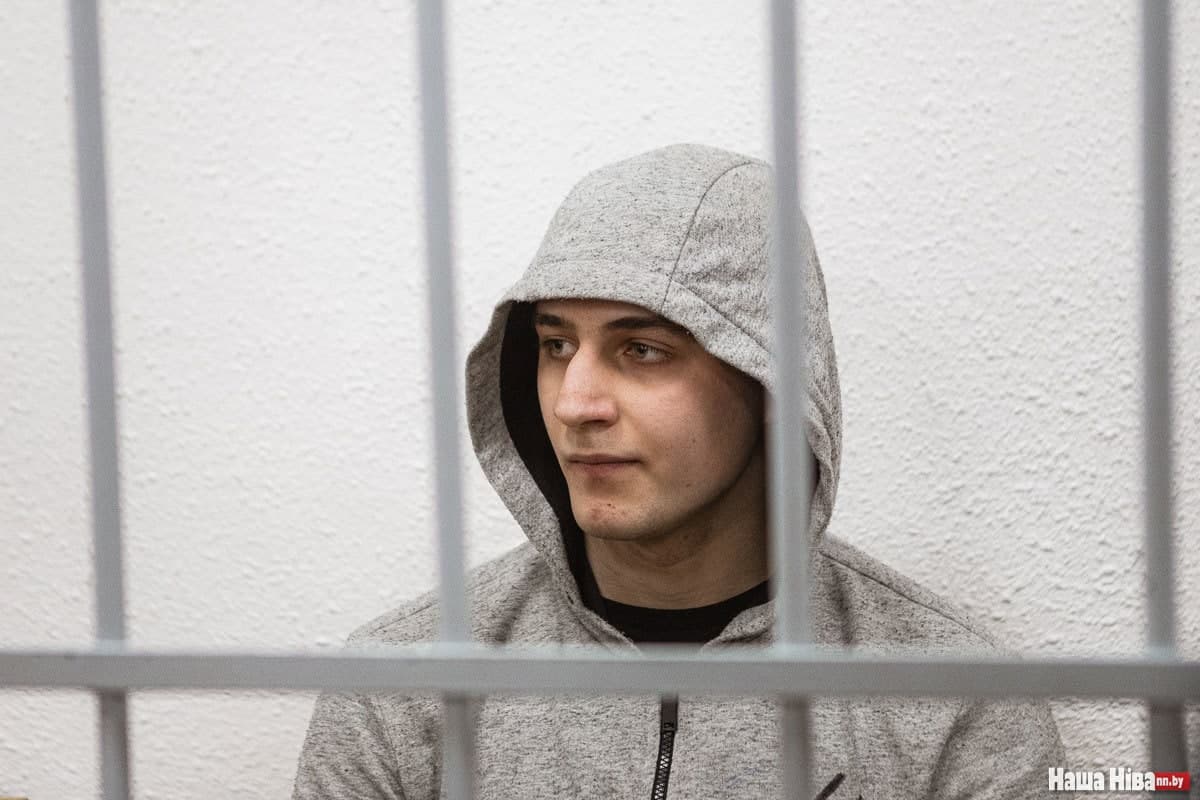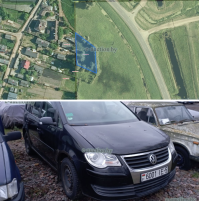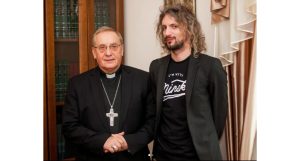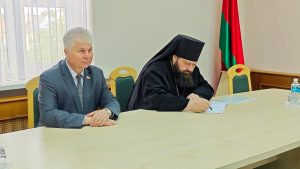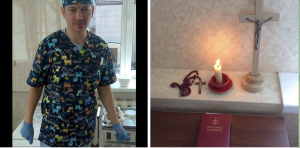Forum 18. BELARUS: “We, political prisoners, were not allowed to attend clubs, the church ..”


Organisation"Forum 18"
Норвежская организация, целью которой является содействие религиозной свободе.
12 November 2021
Olga Glace, Forum 18
Prison officials finally allowed Catholic political prisoner Mikita Yemialyianau a pastoral visit on 3 November. He had just ended a three-week hunger strike in protest at the denial of a clergy visit since his transfer to Mogilev prison in 2020. Prison officials prevented him from renewing a subscription to a Catholic newspaper. Prison officials finally allowed Orthodox Christian Yelena Movshuk a clergy visit in October, her first since her August 2020 arrest. Prison officials prevented her attending a worship meeting in August 2021. “We, political prisoners, were not allowed to attend clubs, the church, the gym or places of study,” a political prisoner freed in September declared.
The regime continues to obstruct political prisoners’ access to pastoral visits from clergy, attendance at limited worship meetings in prison and to receive religious publications. Roman Catholic Mikita Yemialyianau was on hunger strike from 11 to 31 October, partly in protest against denials of pastoral visits from a priest since his transfer to prison in Mogilev in 2020. A letter he sent to a priest asking him to visit never reached the priest. Prison officials finally allowed Yemialyianau to have a pastoral visit from a priest on 3 November.
Prison officials refused to allow Yemialyianau to subscribe to a Catholic diocesan monthly newspaper for the second half of 2021 after confiscating the May issue. Officials claimed the May issue could not be given to him as publications “promoting war, incitement to racial, national and religious hatred, violence or cruelty, and publications of a pornographic nature” cannot be given to prisoners (see below).
Yemialyianau has attended Mass regularly since he was 10 years old and served as an altar boy from the age of 15, according to his mother. “I believe that finding himself in a difficult situation and facing this ordeal, Mikita turned to the Word of God for support and consolation, especially in the absence of clergy visits,” Nastassia Yemeliyanava told Forum 18 (see below).
Yelena Movshuk, a 45-year-old Orthodox Christian, repeatedly tried to get a pastoral visit from a priest from the time of her arrest in August 2020. She hoped to have a pastoral meeting with an Orthodox priest who held a service in the prison in Zarechye in Gomel Region in August 2021, but prison officials prevented her from attending. A different Orthodox priest was able to make a pastoral visit to Movshuk in October (see below).
Prison officials have prevented other political prisoners from attending the limited worship meetings allowed in prison. A nurse from Vitebsk, Yuliya Kasheverova, freed on 16 September after nearly a year in detention, complained that “we, political prisoners, were not allowed to attend clubs, the church, the gym or places of study” (see below).
Since opposition emerged to the falsified 2020 presidential elections, the regime has arrested hundreds of individuals and handed down many long or short jail terms to punish them for opposition or perceived opposition to the regime. The Viasna (Spring) human rights group counted 846 people it recognised as political prisoners as of 12 November 2021, including Yemialyianau and Movshuk.
Encouraged by the state, prison authorities single out political prisoners for special treatment, a human rights defender from the A Country to Live In Foundation supporting political prisoners maintained. “The position of the state is to break the will and the spirit of the individual to make them lose their belief,” the human rights defender told Forum 18 on 2 November.
Meanwhile, a court in Gomel Region punished a Council of Churches Baptist for baptising his son in a lake in a ceremony attended by about 25 people. On 27 August, Rechitsa District Court found Andrei Trifan guilty of holding an unapproved “mass event or demonstration” and fined him 20 basic units, the equivalent for him of six weeks’ wages. The Regional Court rejected his appeal in October. This is the first known fine on a Council of Churches Baptist since October 2018 (see below).
Earlier denials of political prisoners’ freedom of religion and belief
Since the mass arrests from late 2020, political prisoners and their relatives have repeatedly complained that prison authorities restrict their rights to freedom of religion and belief. These restrictions often violate the law (see below), as well as violating Belarus’ international human rights commitments.
After her 18 March arrest, Olga Zolotar repeatedly requested a visit from a Catholic priest, as did Catholic representatives. However, the Investigative Committee which is handling the criminal case against her refused such permission. Finally, on 2 June the prison administration allowed a visit by the Vatican nuncio, Archbishop Ante Jozic. Zolotar’s mother earlier tried to hand in a prayer book for her, but the prison administration refused it.
While awaiting trial in Minsk’s Investigation Prison No. 1 up till April 2021, Pavel Severinets requested a visit from an Orthodox priest in writing on at least five occasions, while his wife Volha requested such a clergy visit on three occasions. Representatives of religious organisations also requested visits with him. However, over nine months not one pastoral visit was permitted.
“The denial of access of priests to political prisoners who are religious, and the use of discriminatory and repressive measures against them are unacceptable in a democratic and legal state and grossly violate one of the fundamental human rights,” Christian Vision declared on 4 May. “Believers are left for many months without access to the sacraments of confession and communion, and without the spiritual support they need.”
Denials of clergy visits are in violation of the UN Standard Minimum Rules for the Treatment of Prisoners (known as the Mandela Rules, A/C.3/70/L.3). Rule 65 includes the provision: “Access to a qualified representative of any religion shall not be refused to any prisoner.”
Denials of access to worship meetings and religious literature are also in violation of the UN Standard Minimum Rules for the Treatment of Prisoners. Rule 66 declares: “So far as practicable, every prisoner shall be allowed to satisfy the needs of his or her religious life by attending the services provided in the prison and having in his or her possession the books of religious observance and instruction of his or her denomination.”
On 15 July, Forum 18 asked the Department for the Implementation of Punishments of the Interior Ministry in Minsk in writing why prison administrations deny prisoners’ (particularly political prisoners) freedom of religion or belief, including the right to have clergy visits and to receive and have religious literature and objects, such as neck crosses. Forum 18 received no reply by 12 November.
Prisoners’ freedom of religion or belief in Belarusian law
Article 12 of the Criminal Enforcement Code guarantees prisoners serving sentences freedom of religious belief, where prisoners “are allowed individually or with other prisoners” to profess, express and share any faith “and participate in carrying out religious worship, rituals and rites not banned in law”. They are also allowed to have and use religious objects and literature.
However, Article 12 restricts the ability to exercise this freedom by this statement: “In conducting religious worship, rituals and rites, the Rules for internal order of prisons or the rights of others who have been sentenced must not be violated.”
Under Article 174 of the Criminal Enforcement Code, prisoners sentenced to death are allowed visits from a priest. However, against the UN Standard Minimum Rules for the Treatment of Prisoners (known as the Mandela Rules, A/C.3/70/L.3), such prisoners may not be granted pastoral visits they request. Death-row prisoners are informed of their executions only minutes beforehand, making final meetings with families and others such as clergy impossible.
Paragraphs 116 and 117 of Interior Ministry Decree of 13 January 2004 (most recently amended on 30 June 2021) on the rules for Investigation Prisons, and a similar Interior Ministry Decree of 30 November 2016 (most recently amended on 2 August 2021) related to Temporary Detention Centres, make provision for prisoners on remand to have religious literature and other objects, as well as receive visits from clergy.
“Persons on remand are allowed to have with them and use religious literature, objects of religious cult for individual use for body or pocket wear, except for piercing and cutting objects, items made of precious metals, stones or of cultural and historical value,” declares Paragraph 116 of the 2004 Interior Ministry Decree.
“In order to provide spiritual assistance to persons on remand, at their request and with the permission of the body conducting the criminal proceedings, it is allowed to invite representatives of religious denominations registered in the Republic of Belarus to the pre-trial detention centre. The services of the ministers of religious confessions are paid at the expense of the persons who are obsessed with the guards,” declares Paragraph 117.
However, the 30 June 2021 to the Interior Ministry Decree of 13 January 2004 stripped those held in Investigation Prison of the right to subscribe to newspapers and magazines. This would deprive them of the right to subscribe to any religious publications (see below).
Rules for prisoners serving sentences in prisons (as set out in a 20 October 2000 Interior Ministry Decree, most recently amended on 10 August 2021) and in open prisons (as set out in a 13 January 2017 Interior Ministry Decree, most recently amended on 22 October 2019) note that prisons can have places of worship. However, the rules contain no guarantees of freedom of religion or belief for prisoners.
Human rights defenders told Forum 18 that prisoners in open prisons can generally visit nearby places of worship if they wish to in non-working time.
Clergy visits to political prisoners often denied
Svaboda.org (RFE/RL)
From 11 to 31 October, 21-year-old Roman Catholic Mikita Yemialyianau, who is serving his four-year sentence in Prison No. 4 in Mogilev for protesting against the jailing of political prisoners, held a hunger strike, including to protest against denials of clergy visits.
Arrested on 19 October 2019, a Minsk court jailed Yemialyianau in February 2020. His appeal was heard in March 2020. He was transferred from Minsk Investigation Prison No. 1, where he was once allowed to see a priest, to Mogilev’s Prison No. 4 on 9 June 2020.
Yemialyianau’s mother Nastassia Yemeliyanava told Forum 18 that since autumn 2020 he has been asking for a visit from a Catholic priest but the prison authorities in Mogilev denied his requests, citing coronavirus precautions. On 30 June, the Interior Ministry announced that it had opened up prisons again to visitors from outside, claiming that the coronavirus situation had improved.
“After the Covid-19 measures were cancelled, Mikita resumed his requests,” she told Forum 18 on 6 November. “But he was given some absurd replies like: ‘The prison is visited only by an Orthodox priest’, or ‘The request should be addressed to the Department for the Implementation of Punishments’. He didn’t know whom to write to.”
On 3 October, Mikita Yemialyianau asked for a visit from a Catholic priest of his choice and sent him a letter, Nastasiya told Forum 18, but the priest never came. The priest told Forum 18 on 4 November that he received neither a notice from the prison nor the letter from Yemialyianau.
On 11 October, following a twenty-day incarceration in the punishment cell for alleged violation of the prison’s internal rules, Yemialyianau began a hunger strike for two reasons: the denial of clergy visits and blocking correspondence with his best friend. He ended the hunger strike on 31 October. Prison officials finally allowed Yemialyianau to have a pastoral visit from a priest on 3 November, his mother told Forum 18.
Yemialyianau has attended Mass regularly since he was 10 years old and served as an altar boy from the age of 15, according to his mother. “I believe that finding himself in a difficult situation and facing this ordeal, Mikita turned to the Word of God for support and consolation, especially in the absence of clergy visits,” Nastassia Yemeliyanava told Forum 18.
Forum 18 called Mogilev’s Prison No. 4 to ask why prison officials had denied Yemialyianau pastoral visits from a priest for so long, as well as refusing his subscription to the “Catholic Herald” newspaper (see below). A prison official told Forum 18 to either send a written enquiry or make an appointment in person with the Prison Head Aleksandr Lauer.
Yelena Movshuk, a 45-year-old Orthodox Christian, is serving a six-year jail term in Prison No. 24 at Zarechye in Gomel Region for participating in opposition protests. Arrested in August 2020, she was sentenced in Brest in April 2021.
Movshuk repeatedly tried to get a pastoral visit from a priest from the time of her imprisonment. However, prison officials approved no pastoral meeting with a priest between August 2020 and October 2021, a human rights defender familiar with her case told Forum 18 on 5 November.
An Orthodox priest who found out from the Christian Vision group of Movshuk’s wish to confess wrote to her in August 2021 inviting her to a worship service in Prison No. 24 scheduled on 25 August. He said she would be able to talk to him and make her confession there. However, the prison administration prevented her from attending.
“From my own experience I know that all letters addressed to prisoners are censored and given to them opened,” the priest told Forum 18 on 5 November, “so there is a possibility that my letter has not reached Yelena.”
The priest added that when he was a chaplain in Gomel Prison No. 4 from 2002-5, he did not observe any religious freedom violations. “Most likely the situation changed at the end of 2020,” he commented to Forum 18, “and became reminiscent of Stalin’s camps, where criminals were pitted against political prisoners and family visits were a reward.”
A different Orthodox priest was able to make a pastoral visit to Movshuk in October, the human right defender told Forum 18.
The human right defender could not say whether Movshuk is now allowed to have regular clergy visits or to attend the church, as the only way of communication is through letters. “According to the information we have, clergy are not allowed to visit political prisoners using any pretext,” commented the human right defender. They pointed out that Movshuk, like other political prisoners, is deprived of everything which ordinary convicts have access to.
The phone of Prison No. 24 in Zarechye was unanswered each time Forum 18 called between 4 and 12 November.
For political prisoners, religious literature often denied or restricted
On 30 June, an Interior Ministry decree (which came into force on 23 September) removed the right of those held in pre-trial Investigation Prison from subscribing to newspapers and magazines (see above). Those already convicted and serving prison sentences have the right to subscribe to any newspapers and magazines at their own expense under Article 89, Part 1 of the Criminal Enforcement Code.
However, in most cases there is discrimination of political prisoners, according to a human rights defender of the A Country to Live In Foundation. “Generally religious literature subscriptions are prohibited, as well as handing it in,” the human rights defender commented to Forum 18 on 2 November. “They may restrict people in taking meals, but to leave them without being able to read religious literature is inhuman and cruel.”
Nastassia Yemeliyanava told Forum 18 that sometimes religious books (including the Bible and prayer books) sent to her son Mikita Yemialyianau were given to him, but parcels with books are limited to 2 kilograms per year. “Soon the time will come for another book parcel and I am going to send him a catechism among other books,” she added.
Nastassia Yemeliyanava said her son had no problem subscribing to the “Catholic Herald”, a monthly newspaper of the Vitebsk Roman Catholic Diocese, while he was being held in Investigation Prison No. 1 in Minsk and in Temporary Detention Centre No. 8 in Zhodino. He was even allowed to subscribe to it for the first six months of 2021 when he was already in Mogilev Prison No. 4. However, prison officials did not hand to him the last publication and denied his request to renew the subscription till the end of the year.
In the response on 16 June to Nastassia Yemeliyanava’s complaint (seen by Forum 18), the then Acting Head of Prison No.4 Dmitry Yeliseyenko insisted that all the publications Yemialyianau had ordered were handed to him except for the May issue of the “Catholic Herald”.
Yeliseyenko referred to Criminal Enforcement Code Article 89, Part 2, which prohibits prisoners “to receive, acquire, store and distribute publications promoting war, incitement to racial, national and religious hatred, violence or cruelty, and publications of a pornographic nature; as well as subscribing to them”. He did not specify which part of the “Catholic Herald” contained the prohibited information.
Yeliseyenko also maintained that the prisoner did not apply for subscription to the “Catholic Herald” for the second half of 2021. Nastassia Yemeliyanava commented that prison officials had crossed out this newspaper by hand from the list of publications that prisoners could subscribe to.
For political prisoners, attending prison worship meetings often denied
Several current or former political prisoners have noted the difficulty of attending the limited meetings for worship allowed in prisons. The administration of Prison No. 24 at Zarechye in Gomel Region prevented Orthodox Christian Yelena Movshuk from attending a worship service in the prison on 25 August (see above).
A nurse from Vitebsk, Yuliya Kasheverova, was freed from prison on 16 September after nearly a year in detention, mostly spent in Prison No. 4 in Gomel. “In the labour camp there were courses in a foreign language and economics,” she told the Reflection blog on 21 September, “but we, political prisoners, were not allowed to attend clubs, the church, the gym or places of study. All that remained was to read books.”
Fined for unapproved baptism in lake
Council of Churches Baptist Andrei Trifan from the town of Vasilevichi in Gomel Region baptised his son in a lake on 1 August. About 25 people participated in the ceremony, including ten of Trifan’s relatives, Council of Churches Baptists noted.
Council of Churches Baptists choose not to seek state permission to exercise freedom of religion or belief.
While the baptism was underway, an unknown man who was driving past took pictures from his car and sent the information to the police. Officers then drew up the record of an offence against Trifan under Administrative Code Article 24.23, Part 2 (“Violation of the procedure for organising or conducting a mass event or demonstration”) of the new Administrative Code, which came into force on 1 March 2021. Officers then submitted the case to court.
On 27 August, Judge Stanislav Ivanyutenko of Rechitsa District Court found Trifan guilty and fined him 20 basic units, 580 Belarusian Roubles (2,025 Norwegian Kroner, 205 Euros or 240 US Dollars). This represents about two weeks’ average wage.
Forum 18 called Rechitsa District Court on 3 November to find out why baptising a child can be considered a public event. However, the court secretary refused to put Forum 18 through to Judge Ivanyutenko and said that information can be given only to participants in a case.
Denying his guilt, Trifan appealed to Gomel Regional Court, insisting that Article 24.23, Part 2 is not relevant for his case. In his appeal he referred to the Constitutional provisions guaranteeing “the right individually or in a group to profess any religion, express and preach their belief, participate in religious practices and rituals not prohibited by law”. However, in October the Regional Court rejected his appeal.
The phone of Gomel Regional Court was unanswered each time Forum 18 called between 5 and 12 November.
“In both courts they told me that they understood my reasoning but had to impose a fine anyway,” Trifan told Forum 18 on 9 November. He pointed out that the fine is to him the equivalent of six weeks’ wages. He expects the fine to be deducted from his salary in small portions over several months.
Trifan does not intend to lodge further appeals. “It is too expensive to proceed with it and I realised that it makes no sense because the result will be the same,” he maintained to Forum 18.
This is the first known court punishment handed down to a Council of Churches Baptist since October 2018. Police in Lepel in the north-eastern Vitebsk Region detained husband and wife Andrei and Tatyana Fokin to stop them singing Christian songs and distributing Christian literature at the entrance to the town’s market. Officers took them to a police station, where they were charged under Article 23.34, Part 3 of the then Administrative Code, which punished repeat offences. Lepel Court fined them in October 2018, and Vitebsk Regional Court upheld the fines the following month.
On 5 August 2021, a Deputy Head of Minsk City Executive Committee Artyom Tsuran warned New Life Protestant Church in Minsk that if it continues to meet for worship each Sunday in the church car park church members risk prosecution under Administrative Code Article 24.23, Part 2 or more serious criminal charges. Bailiffs forcibly evicted the Church from its building in February.
The Church has continued to hold its Sunday meeting for worship outdoors in the car park, most recently on 7 November.
Source: forum18.org



